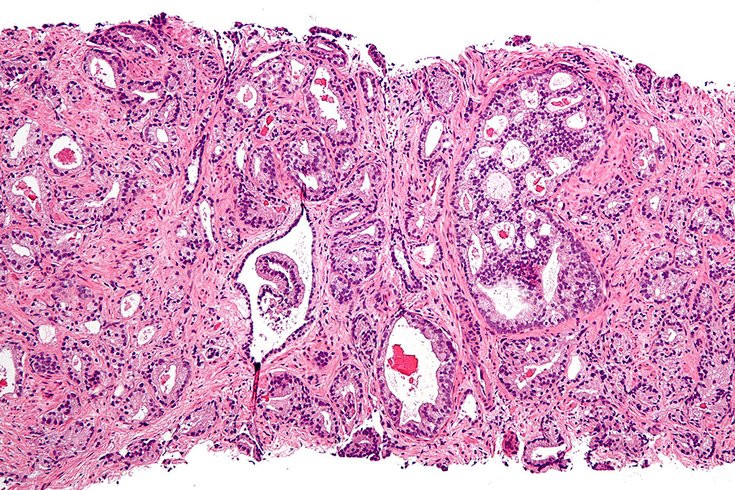
August 17, 2017
 Nephron/via Wikipedia
Nephron/via Wikipedia
Micrograph of prostate adenocarcinoma, acinar type, the most common type of prostate cancer.
Scientists at The Wistar Institute in Philadelphia have developed a new immunotherapeutic strategy to treat cancer using synthetic DNA to directly encode protective antibodies against a cancer-specific protein, according to a study.
It's the first application of the technology, called DNA-encoded monoclonal antibody (DMAb), for cancer immunotherapy, noted the study published online Thursday in the Cancer Immunology, Immunotherapy journal.
Researchers tested the technology in mice to see if it could generate antibodies in their blood stream that would target human prostate specific membrane antigen (PSMA) protein as well as target PSMA-positive tumors. According to the study, scientists found that antibodies were able to bind to the cancer cells and recruited specific immune cells called natural killer cells to shrink tumors and significantly improve survival.
Traditional treatments for prostate cancer, the second most common cancer in men, are invasive and can impair the quality of life of patients. One separate immunotherapeutic approach studied the use of monoclonal antibodies to target the PSMA protein present on the surface of prostate cancer cells to draw an anti-tumor immune response and control the cancer. But that promising technology carries high production costs and multiple infusions are often required.
But Wistar's approach constructs an engineered DNA plasmid to deliver the instructions to make the desired anti-PSMA antibody so that the therapy can be generated in the patient's body in a sustained manner.
Further study of the technology for treatment of human prostate disease and other malignant conditions is warranted, the study concluded.
"There is a great need for such new approaches for prostate disease as well as many other cancers," David B. Weiner, Ph.D., executive vice president of The Wistar Institute, director of The Wistar Institute Vaccine & Immunotherapy Center, W.W. Smith Charitable Trust Professor in Cancer Research, and senior author of the study, said in a statement. "As recent data suggest, PSMA is an important cancer antigen expressed on many human prostate, bladder, renal as well as ovarian cancers, so additional study of the possible benefits of this therapy are important."
The Wistar Institute, located in University City, is an international leader in biomedical research with expertise in cancer research, immunology and vaccine development.